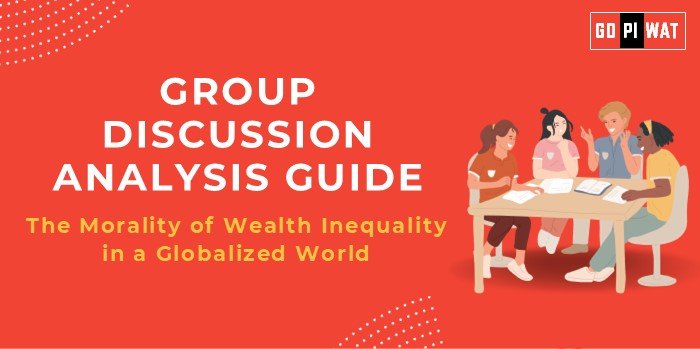📋 Group Discussion Analysis Guide: The Morality of Wealth Inequality in a Globalized World
🌟 Introduction to the Topic
Opening Context: “Wealth inequality, a persistent global issue, has been magnified by globalization, which has reshaped economies, widened income gaps, and raised ethical concerns about fairness and social justice.”
Topic Background: The discussion around wealth inequality dates back to industrialization, but globalization has intensified it by enabling unprecedented economic integration. The wealth gap between and within countries has widened significantly, with the richest 1% now owning over 40% of global wealth (Oxfam, 2024). The topic probes whether this disparity is ethically justifiable, considering its roots in systemic inequalities, policy frameworks, and market dynamics.
📊 Quick Facts and Key Statistics
- 🌍 Global Wealth Distribution: Top 1% owns 40% of global wealth, while the bottom 50% owns less than 2% (Oxfam, 2024).
- 👩💼 Gender Inequality: Women hold only 20% of global wealth.
- 📈 Income Disparity: In OECD countries, CEOs earn 300 times more than the average worker.
- 🌐 Global Poverty: 700 million people live on less than $2.15/day (World Bank, 2024).
🤝 Stakeholders and Their Roles
- Governments: Enact tax policies and regulations to address inequality.
- Corporations: Responsible for equitable wages and ethical supply chains.
- International Organizations: Advocate for global wealth redistribution (e.g., UN, IMF).
- Citizens: Push for reforms through activism and voting.
🏆 Achievements and Challenges
Achievements:
- 🌍 Poverty Reduction: Global extreme poverty has declined by 10% in the past 30 years due to globalization.
- 📊 Social Mobility: Countries like Denmark and Sweden show higher mobility due to progressive taxation.
- 💸 Philanthropy: Billionaires pledged $50 billion to social causes in 2023.
Challenges:
- 💰 Tax Evasion: Global tax havens cause $427 billion in losses annually.
- 🏗️ Wealth Hoarding: Rising inequality in developing countries exacerbates resource disparities.
- 🌎 Global Comparisons: Nordic countries mitigate inequality through social welfare, while nations like the U.S. see widening gaps.
📖 Case Studies
- 🇮🇳 India: High growth rates but stark wealth disparities (top 10% own 77% of wealth).
- 🇨🇳 China: Reduced poverty through globalization but faces urban-rural inequality.
📚 Structured Arguments for Discussion
- ✅ Supporting Stance: “Globalization has reduced absolute poverty, creating wealth and opportunities worldwide.”
- ❌ Opposing Stance: “Wealth inequality undermines social cohesion and perpetuates systemic inequities.”
- ⚖️ Balanced Perspective: “While globalization generates wealth, systemic reforms are crucial to address disparities.”
🗣️ Effective Discussion Approaches
- 📊 Opening Approaches:
- Use global wealth distribution data: “The top 1% own 40% of wealth—how does this reflect on global equity?”
- Ethical Query: “Is it ethical for billionaires to exist when millions live in poverty?”
- 💬 Counter-Argument Handling:
- Highlight balance between wealth creation and redistribution.
- Point to successful models like Nordic social democracies.
🔍 Strategic Analysis: SWOT Framework
- ✅ Strengths: Global economic integration, philanthropy, poverty reduction.
- ⚠️ Weaknesses: Tax evasion, wealth concentration, inequitable policy frameworks.
- 🌟 Opportunities: Social reforms, sustainable economic policies, wealth redistribution mechanisms.
- ⚡ Threats: Populist backlash, political instability, climate inequality.
💼 Connecting with B-School Applications
- Real-World Applications: Topics for finance, public policy, and ethics projects.
- Sample Interview Questions:
- “How should governments balance growth and equality?”
- “What role do businesses play in mitigating inequality?”


